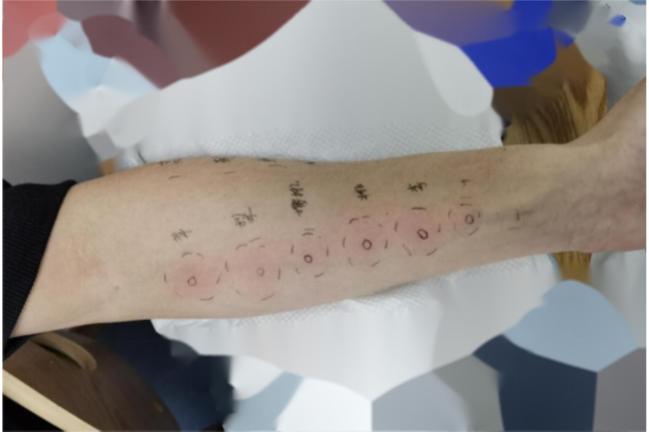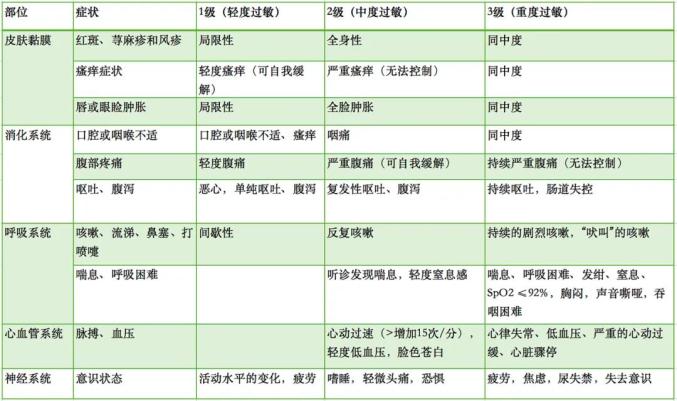After the man took a bite of the peach, his whole body itched. What’s more strange is that. ……
Seen allergic to eggs and milk.
But have you ever seen anyone who is allergic to fruit?
lately
Department of Allergy (Allergy), Zhongshan Third Hospital
Deputy Director Feng Peiying
I met such a special patient.
The man itched all over after taking a bite of a peach.
Xiao Wang (pseudonym) from Qingdao came to the Third Hospital of Zhongshan, Guangzhou for medical treatment. He said that after a small bite of a peach, his throat began to itch, and then his whole body itched, which was very uncomfortable and often lasted for several hours.
What is even more strange is that Xiao Wang’s allergic situation has become more and more serious in the past two years. He has been allergic to apples, pears, cherries, apricots, mulberries, winter dates and other fruits, and his symptoms are almost the same as those after eating peaches.
After carefully inquiring about the medical history and making a detailed examination, Feng Peiying initially judged that Xiao Wang was an "atypical allergic person", not allergic to common milk and eggs, not allergic to latex, and his family had no similar allergic history.
In addition, Xiao Wang’s skin prick test showed that peaches, plums, apples, cherries, pears, etc. showed strong positive allergic reactions, but in serological examination, there were no abnormalities in specific allergens and other conventional allergens of birch, pollen with partial cross allergens with fruits.

Xiao Wang’s skin prick test showed that peaches, plums, apples, cherries and pears were positive.
Medical experts and botanists "think about countermeasures"
Combining the medical history and the results of skin prick,
Xiao Wang can be definitely diagnosed as "fruit allergy"
So for fruit allergies,
How should it be treated?
To this end, Feng Peiying initiated the Multidisciplinary Consultation on Allergy (MDT), and specially invited Professor Luo Shixiao, curator of the herbarium of South China National Botanical Garden and director of the South China Plant Identification Center, to work out a careful treatment plan for the patient together with the core experts in the Department of Allergy (Allergy) in the hospital.
Western medicine treatment suggestion
According to the international food allergy guidelines, western medicine experts adopt the following methods for comprehensive treatment:
1, under the guidance of a doctor, find safe and effective anti-allergic drugs. After the occurrence of allergy, patients should take medicine as soon as possible to control symptoms and seek medical advice in time. At the same time, it is suggested that patients should always have an adrenaline pen and use it in time in case of severe allergic reaction to prevent anaphylactic shock.
2. Patients should also pay attention to diet control, avoid eating known allergic fruits, and pay attention to cross-allergy of other Rosaceae fruits, such as hawthorn, loquat, strawberry, plum, etc. And other Moraceae fruits, such as fig, jackfruit, Broussonetia papyrifera fruit, milk fruit and so on.
Chinese medicine treatment suggestion
The patient has a constitution of qi deficiency with dampness. It is suggested that the patient can be treated with traditional Chinese medicine at ordinary times to improve his constitution, reduce the onset of allergies and reduce the severity of allergies.
Usually you can massage Zusanli (located on the outside of the calf, 3 inches below the calf nose (my four horizontal fingers), and the calf nose is connected with Jiexi; Acupoint massage for 3-5 minutes, or draw a circle to the left for 20 times, then draw a circle to the right for 20 times, once in the morning and once in the evening), Sanyinjiao (located 3 inches above the high point of the medial malleolus, at the posterior edge of the medial tibia; Press the thumb and abdomen for 5 minutes, once in the morning and once in the evening) and other acupoints to improve immunity, improve gastrointestinal function and relieve discomfort when allergies occur.
Knowledge about fruit allergy
What is fruit allergy?
Fruit allergy is one of the common food allergic reactions, which is closely related to many factors such as heredity, environment and fruit types, and often cross-reacts with pollen, especially birch pollen allergy, which is a problem that needs attention in food safety.
Allergies can involve skin (local or systemic urticaria, eczema-like dermatitis), gastrointestinal tract (abdominal cramps, diarrhea, vomiting), nasopharynx and lung (rhinitis and asthma, laryngeal edema leading to dyspnea), cardiovascular system (anaphylactic shock) and other organs, and most of them belong to immediate hypersensitivity.
How to find and treat fruit allergy?
According to "Japan Food Allergy Guide 2020", the diagnosis and severity of acute food allergy need to be confirmed by professional doctors through the symptoms, medical history and related laboratory tests of patients.

Grading of food allergy severity (Japanese guidelines for food allergy 2020). Mild hypotension: less than 80 mmHg for 1 year old, less than [80 +(2× age) ]mmHg for 1-10 years old, and less than 100 mmHg for 11 years old to adults. Definition of hypotension: < 70mmHg under 1 year old and < [70+(2× age)] mmhg between 1 and 10 years old; 11 years old to adults < 90mmHg)
For patients with fruit allergy, according to the principles of food allergy diagnosis, if you find that there are allergy-related symptoms (such as itchy throat, cough, itching all over the body, eczema, vomiting, abdominal pain and diarrhea, etc.) after eating fruit, it is recommended to go to a specialized hospital for food allergen examination, and the diagnosis needs to focus on:
1. I have a history of drug, food or other allergies, especially pollen allergies;
2. The family has a history of allergies;
3. The detection of serum specific allergen receptors of fruit allergens increased, and the detection of total allergen receptors increased;
4. Fruit skin prick test is positive;
5. Oral food provocation test is positive.
How to prevent fruit allergy?
At present, there is no mature fruit desensitization treatment scheme in China. It is recommended that patients avoid eating related allergic fruits, and pay special attention to the cross-allergy phenomenon of some fruits.
Allergic people should avoid eating some common allergic fruits as much as possible. If they are not sure whether they are allergic to this kind of fruit, they can go to professional medical institutions for food allergy testing. It is recommended to keep anti-allergic drugs on hand.
If allergic phenomena occur after eating allergic fruits by mistake, anti-allergic drugs, such as antihistamines, mast cell stabilizers, oral or local use of glucocorticoids and epinephrine, should be used under the guidance of professional doctors.

Suggestions on Diet Management of Common Allergic Fruits
Experts reminded that for fruit allergies, we must "three early and one prevention." Namely, early detection, early diagnosis and early avoidance; Rational use of drugs when allergies occur to prevent the occurrence of serious allergic reactions, and high-risk groups need to keep relevant drugs such as adrenaline to deal with serious allergic reactions.
* Source synthesis of this article: Information Times
Original title: "Man’s whole body itches after biting a peach, and what’s more strange is …"
Read the original text